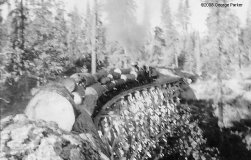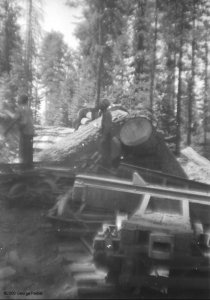Our rolling stock were the locomotives, the logging cars, the lumber cars and various others. In the camp we had 3 Shay locomotives, 1 Climax locomotive, 1 speeder, a steel clad donkey car, and some push cars. The steel gang had a flat car carrying ties (or as the English would say-sleepers), and a flat car carrying rails. Our logging cars, which delivered logs to the mill, differed a bit from the lumber cars, which shipped lumber from the mill to the storage yard at Camino, but both types had pin-and-link couplings, and hand set brakes.
This summer I worked on the landing. We took the logs, that the cats dragged in, and we hoisted them onto the cars. Two us worked at the track, Melvin Lorraine (the camp boss's son, and in charge of the landing) and myself. Two other men unhooked the logs from the cats and using the rigging from the donkey to the spar pole, hooked the logs, which would then be hoisted onto the car. Melvin and I would then unhook the logs, balance the load and secure it.

We were on a rather steep grade. The string of empty cars was parked above us. As a car was needed, we would detach it from the string, and controlling it with the hand brake, would roll it down to the "brow log" for loading. After the car was loaded we would drop it down the grade and attach it to the previous loaded cars and make sure we had brakes set on a few of them. We had loaded all our empties and Melvin and I were through for the day. We sat on the brow log and talked, while the crew above were still unhooking the cats and decking the logs in a neat pile for future loading.
Suddenly we noticed the string of loaded cars was rolling away. In panic, we hastily found our "hickies" (the brake tools) and sprinted for the train. Too late! We had not set enough brakes before, and we weren't fast enough now. The train outran us and disappeared from sight. We were frantic, knowing an engine would be coming up to get the cars and it would be mayhem for the train crew if they met. My heart was pounding harder, my legs were getting weaker, my mind confused and racing, but I ran on. What else was there to do?
Just coming off the main line, the 8 spot was deadheading up the spur, with only the mulligan car behind. Henry Hart was the engineer, but I don't remember the rest of the crew. The fireman was relaxed. There should be enough steam to get them to the landing, and it was all downhill after that. The conductor and the brakeman were standing on the front footboard. All they had to do to finish the day was hook up to the string of loads and wait for the 5 o'clock whistle from the donkey.
Then, out of the woods would come the loggers, the fallers and buckers carefully carrying their saws which they would trade for sharp ones. And would come the limbers, the choker-setters, the cat skinners, and the rest, stowing their lunch pails and water canteens on its deck and climbing aboard the mulligan car.
But, for now, the engine was lazily puffing up the grade like a lone dog trotting up an empty street, as if he knew where he was going. Life was good. This was not like this morning's run when he was pulling 20 loaded cars up a 3 percent grade, saying "I can do it, I can do it! I think I can do it", and, "please, fireman, throw more wood in my fire box; keep my pressure up!"
The conductor was thinking, "I'll go down to Sacramento this weekend and see my wife, she'll need some money, and I need some loving". The brakeman was feeling hungry and wondering what the cook had worked up for dinner. The engineer knew he would have a good meal. He and his wife had been coming up here for 20 years and she probably told him the menu when he left this morning.
Then!, suddenly, and with out warning, in their face were 3 massive logs barreling at them at 40 miles per hour, getting larger and larger, and then, on top of them. There was no time to jump, no time to think, no time to -------!
It was as if a mega-bomb had hit the engine. The boiler exploded, steam and boiling water spraying everywhere. The fire box ripped open, burning wood and cinders flying into the woods on both sides of the track, setting them on fire. The engine was knocked over on its side and pushed along the track until the torn-up track stopped the slide. Chaos!
No living person witnessed this ending. This "rolling stock" ending.
We were still running, more like staggering, Melvin ahead of me, with his long legs and stronger lungs. I don't know what he was thinking; I had probably stopped thinking, just run! run! run!
Then as we rounded a curve, there in front of us, a melange of twisted cars, and logs scattered over the track. The worst must have happened! But why was it so quiet? Where is the engine, and where is the fire? Never would I be so joyous to see a derailment. Never would I again not set enough brakes.
The scenario I wrote above never happened.
But it could have.
The string of cars was stopped by the derailment before the engine met it.


